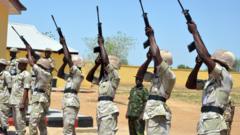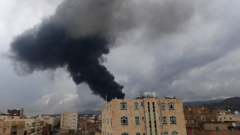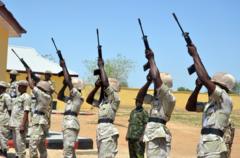In a recent military operation, Nigeria reported the death of 35 jihadists through air strikes near its northeastern border, amidst ongoing violence from jihadist groups and criminal gangs. While military claims detail successes against these groups, advocates express concern over the severe human toll of the prevailing conflicts.
Nigeria's Military Claims Major Gains Against Jihadists Amid Escalating Violence

Nigeria's Military Claims Major Gains Against Jihadists Amid Escalating Violence
Strikes targeting jihadist groups and bandits in Nigeria highlight ongoing conflicts, as casualties and displacements rise across the country.
Nigeria's military announced the killing of 35 jihadists during a series of recent air strikes aimed at thwarting a planned attack on ground troops near its northeastern border with Cameroon. These strikes were part of an ongoing effort to manage the complex security situation that Nigeria has faced for over a decade, which includes violent jihadist factions, criminal gangs, sectarian conflicts, and a surge in kidnappings for ransom.
On Saturday, a coalition of notable Nigerians, encompassing former government officials, business leaders, and human rights activists, voiced alarm over what they described as "war-time levels of slaughter" afflicting certain regions of Nigeria, despite the nation being officially at peace. They referenced a troubling report from Amnesty International, which documented over 10,200 fatalities since President Bola Tinubu's administration began two years ago. In response, the group advocated for the creation of a Presidential Task Force endowed with extensive powers to tackle the surging conflicts, particularly the resurgence of Boko Haram and its splinter faction, the Islamic State West Africa Province (Iswap).
In a broader context, the army reported eliminating nearly 600 militants in the northeastern region within an eight-month period; however, these assertions lack independent verification. The Nigerian Air Force (NAF) affirmed its commitment to providing continual air support to ground troops engaged in dismantling jihadist strongholds in the north-east. According to UN statistics, the ongoing conflicts have resulted in the deaths of over 35,000 individuals and the displacement of around 2 million more.
Moreover, the situation is exacerbated by the recent US State Department approval for a $346 million arms sale to Nigeria, intended to assist in stabilizing the region. A recent analysis by the Institute for Security Studies indicated that at least 15 jihadist attacks have been documented in border areas adjacent to Cameroon and Niger this year, with militants employing modified commercial drones to target military installations – a strategy making troop reinforcements increasingly difficult.
Additionally, Nigeria's military has been conducting strikes against criminal elements referred to as "bandits," particularly in the north-western region of Katsina. Following a recent assault on a village church, which resulted in the deaths of around 50 people and the abduction of approximately 60, military operations reportedly succeeded in rescuing 76 individuals, though tragic casualties, including deaths among children, were noted during the operation.
The cities of Katsina and neighboring Zamfara state have borne the brunt of violence inflicted by criminal gangs, leading to immense loss of life and widespread displacements. As Nigeria continues to grapple with these multifaceted conflicts, observers call for comprehensive security strategies to effectively address the nation's rising turmoil.



















